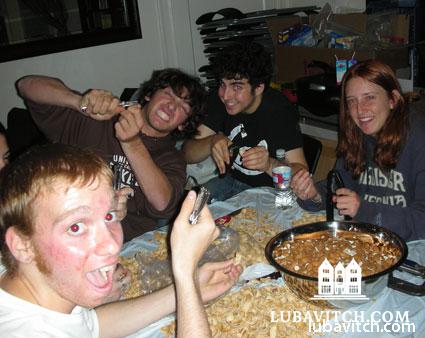(lubavitch.com) The refrigerator truck is winding its way north along the six-hour route from Los Angeles to Berkeley. Inside are 250 pounds of chicken, 100 pounds of meat, and 60 pounds of turkey. Flanking that are 18 cases of wine and another six of grape juice. A crunchy 70 pounds of matzah are making the trip as well.
Pesach is coming to the University of California at Berkeley.
Over 150 students and faculty are expected at the two seders hosted by Rabbi Gil and Bracha Leeds. Dozens more will chow down on kosher-for-Pesach meals during the eight-day festival. The young couple, proudly serving at their alma mater, wants to do everything to make Pesach “meaningful, fun, and creative.
“Most people crave a home environment on this holiday,” explains Leeds. “For many of our students, this is their first holiday away from home and it can be very bittersweet. We want them to experience everything they would expect at home.” Including pitching in.
As soon as their house is koshered for Pesach use, Rabbi Gil and Bracha Leeds will begin an around-the-clock cooking marathon. Students have already signed up for shifts at all hours. All the preparations will take place in the Leeds’ nine by nine, 1910 kitchen complete with one power outlet.
Unlike the regular Friday night dinner or holiday party, Pesach preparations take on a whole new, gargantuan realm. Kosher kitchens are “flipped,” and all chametz (leavened) products and utensils are removed for the week. Chabad custom bars use of many prepared items, even if they are leaven-free, so cooking for the holiday is a whole lot of work. Multiplied, in the case of campus kitchens, often ten-fold.
At Columbia University in upper Manhattan, helping out is a big part of the experience as well. Alumnae return each year to peel potatoes and clean chickens. Despite their heavy workload, many students lend a hand as well. A party gathers before the last Passover meal on day 8 of Passover, to crumble and crush pounds of matzah for homemade matzah balls.
Mrs. Keren Blum, who co-directs the Chabad Resource Center, needs all the help she can get. After cooking for 50 people this Shabbat, Blum and her husband will switch their kitchen to Pesach use and begin cooking for hundreds more. But Pesach is not the only thing on this graduate student’s mind. Blum has a 20-page paper due Monday, another 30-page term paper for Tuesday, and a class the morning of the seder.
Immediately after graduating from Hampshire College, Blum married husband Yonah and became a rebbetzin at Columbia. “I never left campus, never stopped being a student,” she laughs. “I love the stimulation and the challenge of connecting with people intellectually.”
The seder, she says, is an “immersive cultural experience, which students will hopefully enjoy and definitely remember.” The Blums do everything they can to ensure that their seder is an “authentic experience.” Each participant receives his own seder plate and prepares its contents alongside the rabbi. During the seder, everyone reads from the Haggadah and shares their own insights. While many rabbis must abridge or water down their seders, Blum says that “our audience is a captive one. They can sit for four hours discussing and reading.”
Lest you think that Columbia students are only intellectual and staid, they have an entertaining Pesach tradition of their own. At the stroke of midnight, on one of the intermediate days of Pesach, dozens of Columbia students gather for a grand afikoman hunt. Rules are intricate, decoys abound, and the reward is a $100 gift certificate. Last year the box containing the much-sought after matzah was found in the library stacks, and two years ago the search took place in the snow.
For many of the Jewish Dawgs at the University of Georgia, this Pesach will be their first. Rabbi Michoel and Chana Refson anticipate about 150 students at their seders, though “students are notorious for not RSVPing,” so actual numbers may be much higher. Chana Refson readily admits that preparing for so many people, with limited kosher supplies handy, is a lot of work.
After everything is cooked and boxed up, the Refsons will bring their food to their new building, which is waiting to be renovated. The two seders will take place in the building’s large room. Only then can Refson relax. “I love seeing a lot of people come in. I love when they are inspired, satisfied, and learning.”
Though work may seem like an anomaly on this holiday of freedom, Refson disagrees. “Freedom does not mean being free from responsibility. It means going beyond yourself. Freedom for us is being able to give students the ability to celebrate at a seder.”
Rabbis will welcome the “four sons” to their seder tables on over 320 campuses around the world. On Wednesday and Thursday, thousands of students will join together for the Four Questions and four cups of wine.
In Berkeley, Leeds says that presenting Judaism can be challenging on a campus notorious for its radicalism and liberal leanings. Pesach, he believes, is a good time to show students that “Judaism shares a lot of their ideals. It’s not so bad, there is common ground.”
With hand-baked matzah in one hand and a glass of kosher wine in the other, who can disagree?

Be the first to write a comment.